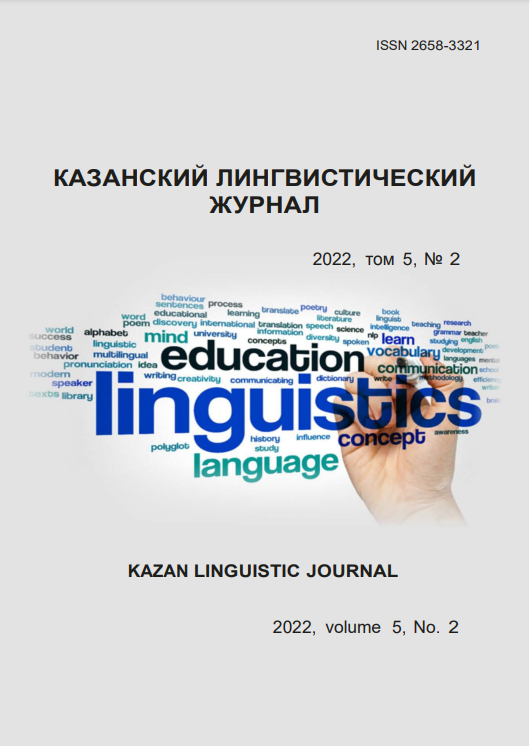Word-forming potential of english MOBA-slang
https://doi.org/10.26907/2658-3321.2022.5.2.158-165
Keywords:
English, slang, game slang, word formation, stem-composition, composite, abbreviation, acronym, affixation, suffix, prefix, cyncopeAbstract
This article examines the main mechanisms of the formation and evolution of game slang based on the material of the English language. The purpose of this study was to describe the structural and derivational features of modern English game slang. The material of the work was the data of online dictionaries of slang for MOBA games, gaming forums, textual and audiovisual documents of the relevant topics (guides, streams and tutorials). The article clarifies the concept of “slang” and provides its main features. The authors of the study establish the differential characteristics of general game slang: a tendency to abbreviation, emotionality. The concept of MOBA slang is specified and concretized. Based on a detailed structural analysis of lexical units, the authors draw conclusions about the productivity of morphological ways of forming new words within game slang. The main trends in the mechanisms of slang formation in the English language are established. Thus, the most productive word-formation model in English is stem-composition. The frequency of abbreviations and acronyms is also high. The least common derivational types include affixal derivation (both prefixation and suffixation), cyncope and telescopy. The authors noted the fact that a significant number of lexical units of the game sphere are formed through semantic transformations.
References
References
Ageeva A.V., Dementyev N.R. Web slang and the main trends of its development. Kazan lin-guistic journal. 2021; 1 (4): 81–92. (In Russ.)
Ziyatdinov A.M. Gamer’s slang. Aktual'nye voprosy filologicheskoi nauki XXI veka: sbornik statei po materialam III Vserossiiskoi nauchnoi konferentsii molodykh uchenykh s mezhdunarodnym uchas-tiem (8 fevralya 2013 g.). Ch. 1. Ekaterinburg: UrFU; 2013. p.77¬82. (In Russ.)
Khomyakov V.A. Non-standard vocabulary in the structure of the English language of the na-tional period. L.: Izd-vo LGU; 1980. 168 p. (In Russ.)
Ageeva A.V., Kashefrazova K.R. English vocabulary in the language of users of online computer games: analysis of the main trends (based on the material of Russian and French). I.A. Boduen de Kurtene i mirovaya lingvistika. Kazan; 2015. p.27¬29. (In Russ.)
Znamerovskaya A.O. Crowdsourcing in localization (based on the material of the computer game “Bioshock Infinite”). Sovremennye problemy filologii, pedagogiki i metodiki prepodavaniya yazykov. Kazan: Izd-vo KNITU-KAI im. A.N. Tupoleva; 2019. p.116¬122. (In Russ.)
MOBALYTICS: Terms that every League of Legends player should know (UPDATED) [Электронный ресурс]. URL: https://mobalytics.gg/blog/league-of-legends-terms/ (In Eng.)
GameGid. Sleng in League of Legends game. Available from: https://gamegid.wordpress.com/2012/05/17/sleng-v-igre-league-of-legends/ (In Russ.)
LOL World. Dictionary of terms. Available from: https://sites.google.com/site/lolworld00/terms (In Russ.)
Slangit. League of Legends slang. Available from: https://slangit.com/terms/league_of_legends (In Eng.)






